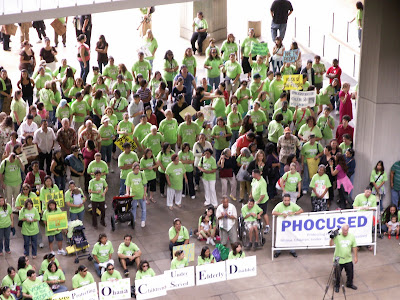
HONOLULU – Of all the years to get a 36-percent raise.
Hawaii legislators face a PR nightmare this year: trying to justify their $12,808 salary increase while constituents right and left are losing their jobs. The increase, which went into effect Jan. 1, brings lawmakers’ base salaries to $48,708.
A second raise of 3.5 percent is scheduled for Jan. 1, 2010, unless the Legislature passes a bill to suspend it.
The raises were put into place by an independent Commission on Salaries that voters approved on the 2006 ballot. The commission also prescribed pay hikes for the governor and Cabinet, and state judges.
Being a legislator in Hawaii is not considered a full-time job – the legislative session lasts from mid-January to early May and was designed so that “citizen lawmakers,” rather than professional legislators, could bring their particular areas of interest and expertise to the Capitol.
Hawaii lawmakers are by no means the poorest or the best paid, according to a study by the Lexington, Ky-based, Council of State Governments. The council provides policy analysis and tracks national conditions and trends in state governments.
The study, “
State Legislator Compensation: A Trend Analysis,” found that the average legislative salary in 2005 was $25,908, and hasn’t kept up with inflation.
Keon Chi, editor-in-chief of CSG’s annual Book of the States, wrote the 38 page report.
“Compensation levels have an impact on recruitment, retention and the work of the legislature,” said Chi in a statement. “If legislators are not paid adequately, then candidates are drawn from a smaller pool. High pay broadens that pool. You can’t expect to attract good candidates with pay that is lower when compared to other jobs and professions.”
But these are tough times, and Gov. Linda Lingle has asked the Legislature to freeze raises for her and her staff, as well as themselves. She says that could save more than $4 million.
But legislative leaders, including House Speaker Calvin Say, D-St. Louis Heights, Wilhelmina Rise, and Senate President Colleen Hanabusa, D-Nanakuli, Maili, Waianae, say the raises are long overdue and well deserved. They note that the executive branch and judges have received raises, but the Legislature has received only three raises in 15 years.
“Given those increases and the rates of pay provided to the Executive and Judicial branches, asking legislators to forgo their pay raise places an undue and inequitable burden on the Legislative branch,” Hanabusa said in a statement. “As we address these issues, all concerned have a duty to understand the true facts behind our deliberations, to work within the spirit and letter of our laws, and to avoid creating distracting political conflicts where none exist.”
Lingle’s proposed salary freeze would affect 208 employees, including the governor, lieutenant governor, cabinet heads and deputies and justices of the Hawaii Supreme Court and all state court judges.
The administration employees are scheduled for salary hikes of 5 percent on July 1, 2009 and 3.5 percent on July 1, 2010. The justices and judges are scheduled for salary increases of 10 percent in 2009 and 3.5 percent in 2010.
Lingle’s bill,
HB 1109, asks state leaders to “lead by example during fiscally challenging times” by deferring for two years the salary increases recommended by the Commission on Salaries for legislators, judges, and senior officials of the executive branch for the next two fiscal years.
Other related bills:
SB 479, filed by Senate President Colleen Hanabusa, by request, requires an across-the-board decrease of the salaries recommended by the commission on salaries for executive branch heads and their deputies, judges and justices, and legislators.
SB 363, by Sen. Sam Slom, R-Hawaii Kai, Kahala, abolishes the Salary Commission, while
SB 368, also by Slom, proposes constitutional amendment allowing the Legislature to suspend the increase in legislative salaries as recommended by the Salary Commission.
HB 1816, by Rep. Della Belatti, D-Tantalus, Makiki, McCully, reduces by 5 percent the current salaries of executive, legislative, and judicial branch employees and freezes salaries of such employees for fiscal years 2009 and 2010.
HB 1670, also by Belatti, requires the Commission on Salaries to hold public hearings and provide public notice of each hearing.
SB 221, by Sen. Will Espero, D-Ewa, Lower Waipahu, requires the Commission on Salaries to conduct a public hearing on Oahu prior to submitting its recommendations to the Legislature. Democratic Sens. Robert Bunda, Mike Gabbard, and Dwight Takamine, as well as the Republican Sen. Slom, have cosigned on the bill.
 HONOLULU -- It’s not a good time to be a smoker.
HONOLULU -- It’s not a good time to be a smoker.






































.jpg)
